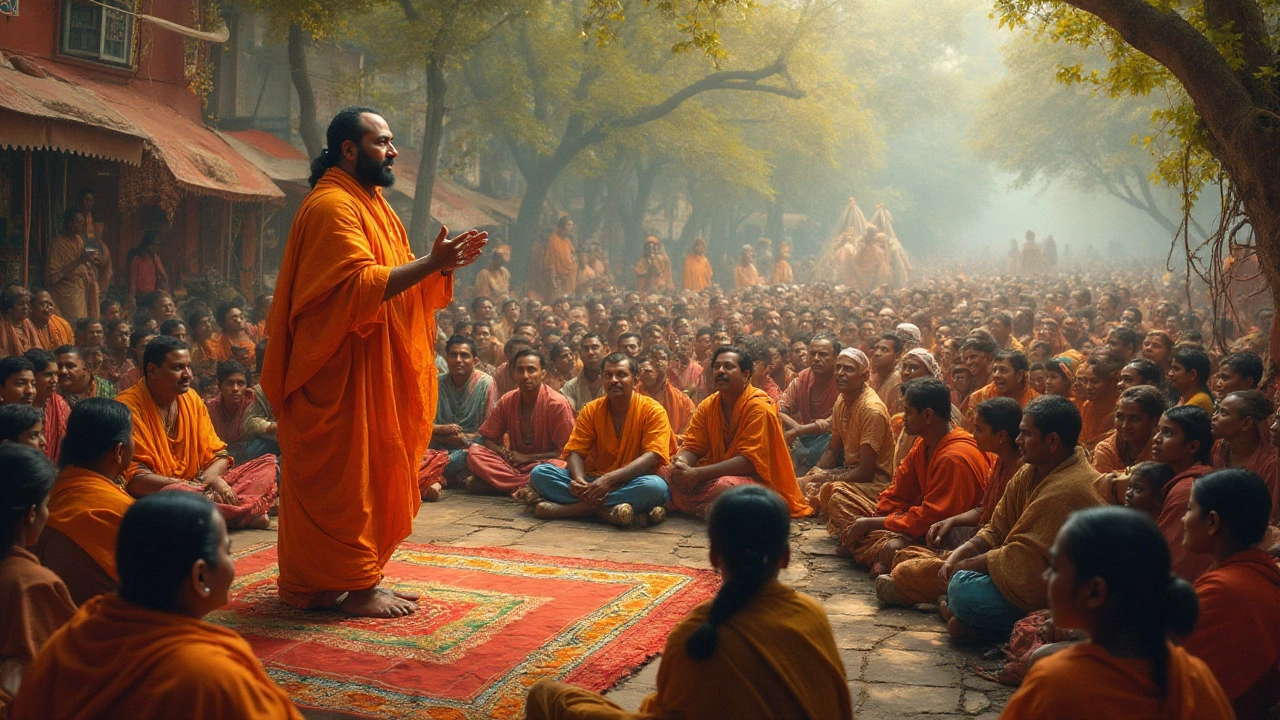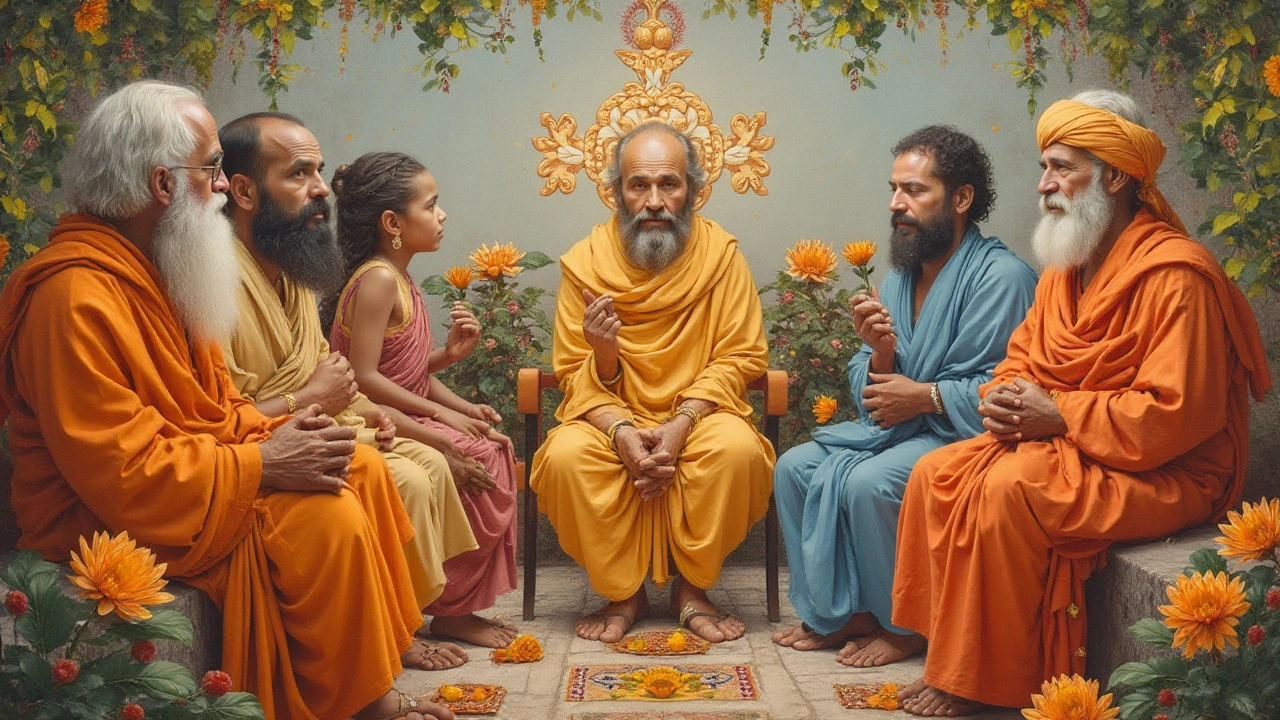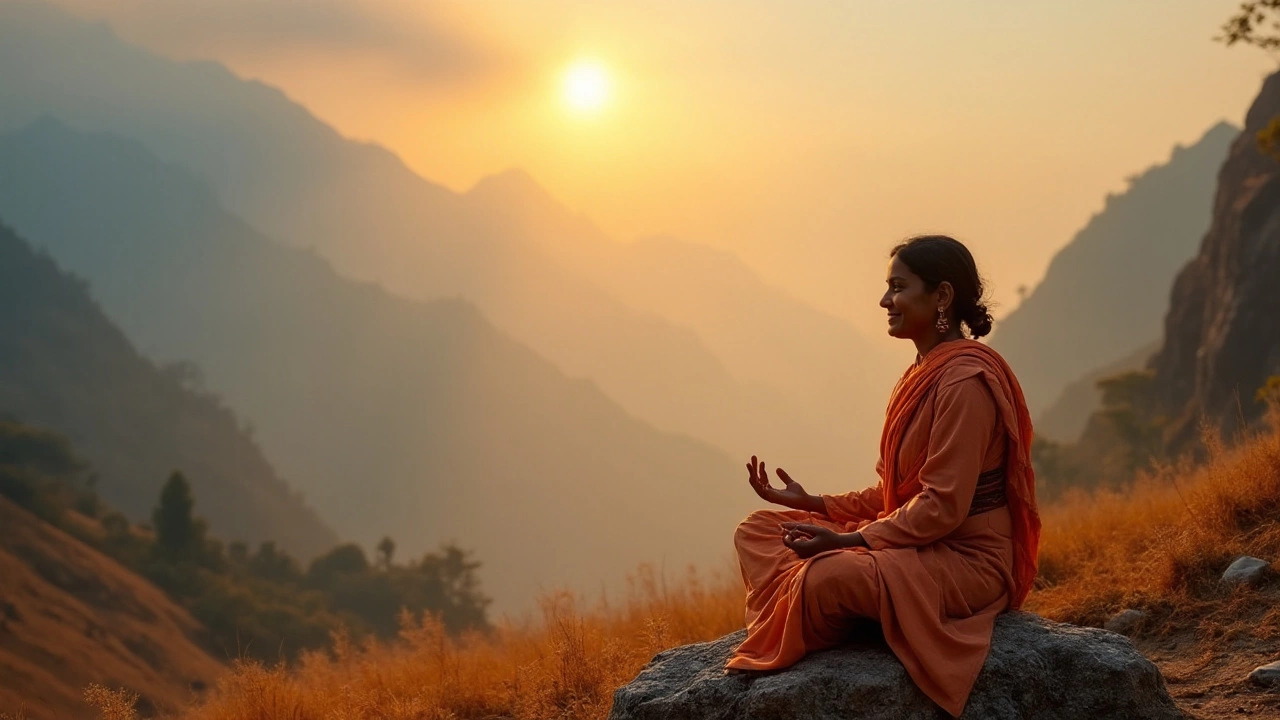India's spiritual landscape is a vibrant tapestry, woven with centuries of tradition and wisdom. Renowned for its profound teachings, the country has given birth to numerous spiritual leaders whose insights continue to resonate globally.
In this exploration, we delve into who stands as the most impactful spiritual figure in India today, exploring their teachings and the enduring legacy they have left behind. By understanding their influence, we can gain a deeper appreciation for how spirituality guides not only individual lives but also the societal values at large.
Join us as we journey through India’s soulful paths, celebrating the personalities whose quotes and teachings have touched hearts and broadened minds across the nation and beyond.
- India's Rich Spiritual Heritage
- Influential Spiritual Leaders
- Impact of Spiritual Teachings
- Famous Spiritual Quotes
India's Rich Spiritual Heritage
India's spiritual heritage is a fascinating voyage through millennia of history, reflecting the tapestry of diverse and vibrant beliefs that form the country's cultural ethos. As one of the world's ancient civilizations, India stands unique in its continued reverence for spiritual exploration. From the chants in the Vedic texts to the profound teachings of modern-day spiritual leaders, the spiritual terrain here is nothing short of awe-inspiring. This depth of spirituality is what draws seekers and truth-seekers from around the globe to the Indian subcontinent, finding solace and wisdom in its tranquil ashrams and sacred sites.
Throughout history, India's spiritual journey has been marked by the emergence of a myriad of religious philosophies, all co-existing in harmony yet presenting a rich, intricate mosaic of beliefs. Hinduism, considered the oldest organized religion in the world, with its vast pantheon of deities, emphasizes the cyclical nature of life and the importance of karma. Then there is Buddhism, which originated in India with Siddhartha Gautama, the Buddha, who attained enlightenment under the Bodhi tree. His teachings of mindfulness and detachment resonate with individuals seeking peace amidst life's chaos.
Moreover, Jainism, with its principles of non-violence and strict self-discipline, offers a path of ascetism and truth. Sikhism, founded in the Indian region of Punjab, presents a monotheistic perspective, advocating for equality amongst all humans and a life of devotion and service. These diverse religions, each with their own sacred texts and rituals, contribute significantly to India's spiritual narrative.
"The soul is neither born, and nor does it die," declares the Bhagavad Gita, one of the sacred scriptures within Hinduism, highlighting the belief in an eternal spirit beyond the confines of the physical world.
The impact of spiritual leaders like Mahatma Gandhi, who embraced the power of truth and non-violence derived from his deep spiritual conviction, exemplifies how spirituality transcends personal enlightenment to influence societal change. His legacy of peaceful resistance continues to inspire movements around the world, showcasing how spiritual heritage can foster global influence.
Indeed, India's spiritual quotes serve not only as guiding principles for personal development but also as shared wisdom for collective harmony. Whether through ancient Sanskrit verses or the words of contemporary gurus, these insights encourage introspection, compassion, and a mindful approach to life's journey. Spirituality in India is not confined to doctrine but rather a dynamic, living tradition that adapts and evolves, mirroring society's cultural advancements while retaining its timeless essence.

Influential Spiritual Leaders
India's spiritual richness is undeniably vast, with an array of spiritual leaders who have enlightened countless seekers across the globe. From ancient sages to contemporary gurus, these figures have not only shared wisdom but have also shepherded societal changes through their teachings. Their influence stretches across philosophies, religions, and eras, establishing India as a beacon of spirituality. Among these are figures like Swami Vivekananda, whose teachings introduced the principles of Vedanta and Yoga to the Western world. His speech at the 1893 Parliament of World Religions in Chicago remains a milestone in spiritual discourse, where he addressed the gathering with his iconic opening, "Sisters and Brothers of America." This gesture of unity resonated with people of varied backgrounds, highlighting his global approach to spirituality.
Another remarkable leader, Mahatma Gandhi, known primarily for his role in India's freedom struggle, was deeply rooted in spiritual principles. Gandhi's concept of non-violence, or Ahimsa, drew upon ancient Hindu teachings, demonstrating how spirituality can be harnessed as a formidable force for social change. His life was a testimony to how spiritual leadership transcends religious dogma, inspiring numerous global movements. As he once said,
"The best way to find yourself is to lose yourself in the service of others."This emphasis on selflessness remains a guiding mantra for many leaders worldwide.
In more recent times, one cannot overlook the influence of leaders like Sri Sri Ravi Shankar and Sadhguru. Sri Sri Ravi Shankar's Art of Living Foundation emphasizes meditation and community service, bridging social divides through peace initiatives and yoga workshops. With its presence in over 156 countries, the organization stands as a testament to how spiritual teachings can unite diverse cultures. On the other hand, Sadhguru, with his pragmatic approach, simplifies ancient Indian wisdom for today's fast-paced world. His Inner Engineering programs and popular talks strive to bring mental clarity and well-being to a global audience. These modern leaders have adeptly utilized technology to disseminate their teachings, proving that spirituality is ever-evolving.
Beyond their quotes and philosophies, many influential spiritual leaders have made significant contributions toward global harmony and environmental awareness. For instance, the impact of Tibetan leader His Holiness the Dalai Lama's teachings on compassion continues to inspire widespread humanitarian efforts. His message transcends cultural and religious boundaries, advocating for peace and understanding as pillars of a harmonious world. Similarly, Mother Teresa, canonized as Saint Teresa of Calcutta, dedicated her life to the service of the needy and her example of unconditional love resonates across many nations. Together, these teachings present a universal path toward a more equitable and just society.

Impact of Spiritual Teachings
Spiritual teachings have left an indelible mark on India's societal fabric, shaping its moral and ethical parameters in profound ways. These teachings, drawn from a rich array of traditions and leaders, offer more than just personal development; they steer social consciousness toward harmonious coexistence. Understanding the impact of such teachings involves examining both historical and contemporary influences on people's lives. Many of India's spiritual leaders, such as Swami Vivekananda and Mahatma Gandhi, have emphasized values of truth, non-violence, and compassion.
In India, spiritual insights act as a potent force for fostering unity amidst diversity, ushering an era of cultural understanding. As diverse as the landscapes of India, the philosophies stemming from these influences cater to various spiritual needs. Spirituality in India offers universal principles such as self-discipline and empathy, which undoubtedly redefine the boundaries of individual potential. For instance, these teachings serve not only personal growth but also societal development by advocating for sustainable practices and community wellbeing. As Swami Vivekananda eloquently articulated, "The greatest religion is to be true to your own nature. Have faith in yourselves." His words embody the spirit of self-belief and inner strength.
Spiritual Guidance and Mental Health
In recent years, the growing importance of mental health has steered individuals toward spiritual practices that encourage mindfulness and inner calmness. These practices can lessen the burden of stress and anxiety, offering a shield against the fast-paced lifestyles that many face today. Embracing spiritual advice from thought leaders is akin to finding a safe harbor amidst life's tempests. The teachings advocate for meditation and reflection, drawing individuals into a meditative state that nurtures resilience and emotional stability.
Spiritual leaders in India inspire a cultural narrative wherein self-awareness acts as the cornerstone of mental wellness. By promoting peace and self-realization, these teachings contribute significantly to reducing mental distress. Their emphasis on intentional living insists on the understanding and nurturing of one's intrinsic value. Engaging with these practices helps in developing patience, gratitude, and a deeper understanding of one's life purpose. Consequently, spiritual instructions play a crucial role in navigating the complexities of modern living, offering solace and clarity to those who seek them.

Famous Spiritual Quotes
India's spiritual journey is remarkably rich, characterized by a multitude of voices that have left an indelible mark on both individual lives and collective consciousness. The country is renowned for its profound spiritual leaders, whose quotes continue to resonate across generations, offering solace and guidance in a rapidly changing world. These words, often simple yet strikingly profound, encapsulate timeless wisdom that has been carried forward through the ages.
One such luminous figure is Mahatma Gandhi, whose life and teachings championed non-violence and truth. His famous quote, "Be the change you wish to see in the world," is a clarion call to personal responsibility that inspires action rather than apathy. Gandhi's insistence on truth as the highest ethical standard has empowered countless individuals to pursue justice and integrity, reshaping modern social movements worldwide.
Equally impactful are the teachings of Swami Vivekananda, known for his relentless advocacy of spiritual unity and empowerment. His declaration at the Parliament of the World's Religions in 1893, "Arise, awake, and stop not till the goal is reached," serves as a powerful statement urging perseverance and self-discovery. Vivekananda believed deeply in the potential of every individual, particularly the youth, to rise above challenges and contribute positively to society. His words continue fostering a sense of purpose and intellectual curiosity.
"In a conflict between the heart and the brain, follow your heart." — Swami Vivekananda
The resonance of these spiritual quotes lies in their simplicity and universality, transcending geographical and cultural boundaries. This is exemplified by the timeless teachings of Sri Ramakrishna Paramahamsa, who expounded on the universality of divine love. His messages emphasize the importance of realizing the oneness of existence, a viewpoint that encourages harmony amidst diversity. Ramakrishna's teachings reflect a deep understanding of the human psyche and the universal quest for spiritual fulfillment.
Moreover, India’s spiritual wisdom is not limited to historical figures but extends to contemporary thought leaders who echo ancient truths. For instance, Sadhguru, a modern-day mystic, often interprets traditional insights in ways accessible to today’s audience. His quote, "The only way to experience true well-being is to turn inward. This is what yoga means – not up, not out, but in," invites individuals to seek inner transformation as the path to genuine happiness.
In compiling these quotes, it becomes evident that India's spirituality is a vast and intricate tapestry. It offers nourishment not just for the soul, but also practical guidance that holds relevance in both individual lives and societal discourse. These famous spiritual quotes are beacons of hope and wisdom, encouraging both introspection and proactive change, illustrating an enduring legacy that is ever-evolving yet steadfast in its essence.
